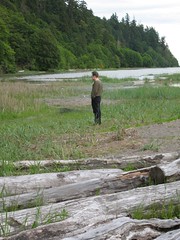While I didn’t manage to run a playtest session last night, I did participate in a Cthulhu Dark (Graham Walmsley’s excellent one-page system for running uncompromising Mythos sessions) adventure. While the Keeper (probably) had a plan and a map, I don’t think the adventure had much more preparation. No, I tell a lie – a sensed a hint of a Esoterrorist adventure in there with one very specific and memorable scene.
Basically the adventure had a very vague premise and characters with an awareness of each other and no common purpose. We had a reverend, a funeral director, a lady ex-drug addict, a hostillier, and an ice cream vendor – in a run-down, has-been village. The mayor announced a plan to bring fresh blood to the area with a coach load of immigrants or students (a little confused on the details from the beginning). When they arrived, the village held a fair, but the students (definitely students) seemed to be more interested in visiting a local lighthouse. The reverend (Reverend Ginger) witnessed their visit to the lighthouse and sensed something thoroughly disquieting about the whole affair. Anyway… I digress from the point.
Purpose. That’s my point.
As an improvised adventure the Keeper had a vision of the way forward, but the characters didn’t. As fresh concepts in our heads our characters didn’t even really have a life of their own. Not knowing where to go from nothing, I felt we floundered a bit. It seemed a little like waking in the middle of a field or a pitch black space, without any recollection of who, where or why you are. A drip feed of plot can guide you, but you can still end up feeling like you’re swaying around aimlessly trying to find a wall or some other distinctive surface to give you some sense of shape, direction or purpose. In a situation demanding the Keeper to improvise this seems like a tough call to avoid. If you’re finding your own way from a vague concept or assumption, how can you drip anything on to the players to give their characters a sense of anything.
In Stench of the Sea I have come around to the fact that almost any feature of the environment needs to have a potential for something. I want every character to present some prospect for a way forward or a plot hook, even if it means simply helping Ralph the farmer to get his goat under control. From the two playtest sessions so far, I know that having a linear adventure in mind doesn’t work alone. If you dangle a carrot on a rope from the ceiling at the centre of a pitch black room, how can you expect anyone to find it? You can’t even assume they’ll be reaching up in the air when the occupants of the room start wandering around seeking a purpose. Maybe they’ll just sit down, start crawling, or running blindly in one direction with their arms outstretched – none of which options will find that carrot hung slightly above head height and demanding a very particular line of approach.
The playtest managed to continue without the characters finding the hook because other aspects had purpose – the farmer did have an errant goat, the landowner had delusions of grandeur and a suspicious issue with xenophobia, and a couple of giant crabs decided to attack some unsuspecting fishermen regardless of what the players chose to do. None of these necessarily tied in directly with the plot or advanced the story in a particular direction, but they did offer a chance to engage and room for questions to arise. The Magician visited the landowner twice and took a particular interest in the content of his study, which seemed to contain some queer evidence about his xenophobia. Bert took the attack on the fisherman as a chance to get free seafood, while the Mystic had a vision of a threat from the sea.
The playtest showed that the Stench mustn’t have a single purpose; the module must hold a plethora of smaller morsels, seeds and opportunities that might lead nowhere, but contribute to a sense of something going on. Every single one of these might prove to be a red herring in the greater scheme of things, but they provide the gamesmaster with scattered chances for engagement, entertainment and involvement.
Related articles
Discover more from JUST CRUNCH GAMES
Subscribe to get the latest posts sent to your email.




